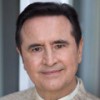Yoga, though ancient, is evolving in our time as Yoga therapy comes of age.
What is Yoga therapy?
Think of it as replacement therapy—replacing old habits that didn’t serve well with new and improved ones. Used therapeutically, yoga becomes a healing art that encompasses the body, the mind and the emotions, offering guidance along a path for meaningful lifestyle change for healing and prevention.
What sets modern yoga therapy apart from traditional Indian yoga therapy is its relationship with complementary Western medicine. Modern, yet continuing to draw upon the deep historical wisdom that makes yoga, yoga and not just a set of exercises, yoga therapy treats the whole person.
Today’s yoga therapist may examine a client’s x-ray report and consult with the treating medical practitioner as well as draw upon Pantajali’s Yoga Sutras, the Pancha Maya Kosha model and Ayurveda.
The father of modern Yoga, the late Sri T. Krishnamacharya, used the art of yoga therapeutically with his own blend of yoga and Ayurveda, including ritual, chanting, food choices, herbs, advanced breathing, relaxation as well as asana, to meet the unique needs of each individual.
He also produced students who became the West’s most influential teachers of Indian therapeutic yoga, his son T.K.V. Desikachar and B.K.S. Iyengar. Each took something different from their master teacher and developed his own approach and the ideas and teachings of each have been disseminated across the globe.
The Yoga Therapy Rx Program at Loyola Marymount University (LMU) embodies the spirit of Desikachar’s teachings with its whole person approach to adapt the tools of yoga to the individual as it also informs itself with the foundations and developments in Western medical and healing sciences.
The yoga therapist comes in after the acute phase has subsided, often working with the referring clinician and guides the individual along a recovery path that puts him or her in a better position to avoid recurrence.
Not just for back or shoulder pain, yoga therapy, in conjunction with clinical care and psychotherapy depending on the situation, can ease pain and reduce suffering for individuals dealing with a host of chronic conditions, such as multiple sclerosis, PTSD and other conditions for which we might not normally think of yoga as an aid.
While yoga therapy is not a cure, it can improve the quality of life, and may augment the efficacy of clinical treatment. For instance, in the case of cancer, it may improve the patient’s ability to comply with difficult treatments.
As you might expect, as an adjunct for treatment for such conditions as PTSD, addiction recovery and other psychological diagnoses as well as physical diseases that cause great emotional distress, the prescription would not be “do 12 dynamic cobras and call me in the morning”, but rather, a breath-based practice, drawing upon other dimensions of the human experience and spirit in addition to movement.
The four-year training program at LMU breaks new ground with its inclusion of a culminating internship year at the Venice Family Clinic, where the yoga therapy intern joins an alternative medicine treatment team comprised of physicians, chiropractors and an acupuncturist, that works with the under served.
Each year of study builds the yoga therapist’s knowledge and skills, starting with the musculoskeletal system, advancing to understanding the therapeutic application of yoga to the body’s internal systems. Then, a practicum of clinical observations and didactic experiences and concluding with the internship.
Indeed, yoga therapy as a field is coming of age, as organizations such as the International Association of Yoga Therapists (IAYT) engage in discussion concerning how to ensure high standards of training and assurances to the public that go beyond the reputation of the particular teacher or lineage. Today, we are witnessing the blossoming of this new profession of yoga therapy as it is coming to claim its place and gain recognition in the world of complementary medicine.
The Yoga Therapy Rx Program at LMU opened its doors to its first students in 2005. Today there are more than 100 yoga therapy schools with memberships in the IAYT contributing to this growing field. So, the next time you want a fresh perspective on something that is ailing you, please consider yoga therapy as an option.
Like elephant Yoga on Facebook.
Assistant Ed: Steph Richard/Ed: Bryonie Wise








Read 4 comments and reply